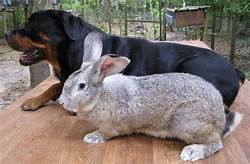Are Giant Rabbits Good Pets?
Giant rabbits are a popular choice for pet owners due to their gentle nature, unique appearance, and relatively low-maintenance care requirements. However, it is important to note that these animals require specific accommodations and handling in order to thrive as pets. Here are some factors to consider before deciding if a giant rabbit is the right pet for you.

Size and Housing
As the name suggests, giant rabbits can grow to be quite large. Some breeds can reach weights of over 20 pounds and lengths of over 3 feet. This means that they require spacious housing and exercise areas to stay healthy and happy. Hutches or cages should be at least 6 feet long and 4 feet wide, with plenty of vertical space for hopping and climbing. Outdoor enclosures should be even larger, with strong fencing to prevent escapes and protect from predators.
Diet and Nutrition
Giant rabbits have a strict diet that is high in fiber and low in protein. A majority of their diet should consist of hay, such as timothy or orchard grass. Fresh vegetables and fruits can be offered daily as treats or supplements, but they should make up no more than 10% of the rabbit's diet. Avoid feeding giant rabbits pellets or seeds, as these are high in calories and can lead to obesity and health problems. Fresh, clean water should be available at all times.
Exercise and Activity
Giant rabbits are active animals that require regular exercise and playtime. They need to be able to run, hop, and explore to stay healthy and prevent boredom. Provide your rabbit with a variety of toys and interactive objects to keep them entertained. Daily supervised outdoor exercise is ideal, but indoor exercise can also be provided with a large playpen or designated room. Ensure that the space is safe and free of hazards.
Grooming and Health Care
Giant rabbits require regular grooming to maintain their long fur. Brushing should be done at least once a week to prevent mats and tangles. Nails should be trimmed regularly to prevent overgrown claws from causing discomfort or injury. Giant rabbits are also prone to dental problems, so regular dental checkups and cleanings are essential. Additionally, it is important to take your rabbit for annual veterinary checkups to monitor their health and prevent potential illnesses.
Temperament and Behavior
Giant rabbits are generally known for their gentle and docile nature. They are social animals that enjoy interacting with humans and other rabbits. However, it is important to note that each rabbit has its own unique personality and temperament. Some giant rabbits may be more independent and shy, while others are more outgoing and affectionate. Proper socialization and handling from a young age can help ensure that your giant rabbit is well-behaved and friendly.
Conclusion
Giant rabbits can make wonderful pets for owners who are prepared to provide them with the necessary care and attention. They require spacious housing, a healthy diet, regular exercise, and proper grooming and health care. Before bringing a giant rabbit into your home, make sure you have the time, resources, and commitment to provide for their needs.
Declaration: All article resources on this website, unless otherwise specified or labeled, are collected from online resources. If the content on this website infringes on the legitimate rights and interests of the original author, you can contact this website to delete it.



